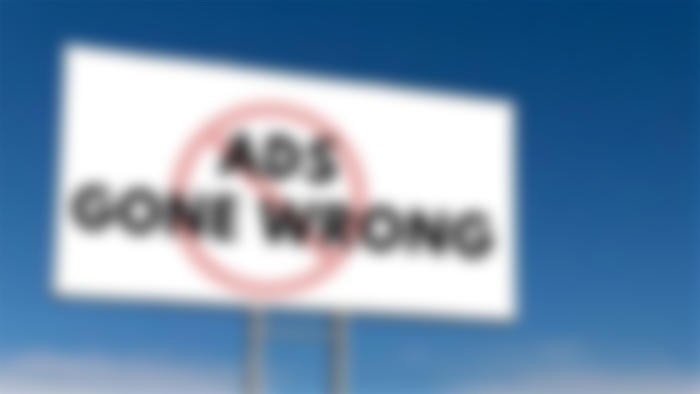Ads Gone Wrong II: Inappropriate Ads that landed companies in trouble.
Inappropriate Ads that landed companies in trouble.

Creating wrong copy can have serious consequences on a business. From soiling the company name to a public boycott of its products/services, debt to loss to legal issues, and even total shutdown, a seemingly small wrong move can cause great harm to a company. You only need to ask H&M or perhaps Reebok or best, Lifelock security company what the cost of one wrong advert could be.
Don't laugh, it's not funny (or maybe it kinda is) but some of these ads will make you shake your head in wonder(at the craziness of them). Continued, here are some company adverts that went reeaally wrong.
See #1 to #4 in the previous article - Ads gone wrong I.
#5
Reebok "Cheat on your girlfriend and not your workout" ad

Wide reactions of anger and disappointment erupted from the public when Reebok; an international fitness clothing and footwear company released this ad that supposedly told its audience to "cheat on their girlfriends". While the advert seems to be trying to pass a message, the public weighted the inappropriateness of the content over the actual information in the advert. And...in truth, the choice of words of the copy was er...unethical and offending. Not a nice job there, Reebok copywriters.
The interesting thing there is; Reebok had only released the advert in Germany however, somehow, it spread around and the global community got a good earful of it. Protests were made for the boycott of Reebok's products alongside heated comments from the public. Whatever had made Reebok come up with that as copy, they are sure not to ever try again.
#6
You mean a woman can open it?

The insult supposedly drips from the underlining in this picture. Perhaps, it was the emphasis placed on the word there or even the word itself or both, there was too much that wasn't agreeable about this ad. Although that isn't the exact point of the advert nor is it the only problem with it, it's just...well, a place to start listing those problems.
In 1953, Alcoa Aluminum company released this advert to promote their HyTop screwable bottle cap. The ad features a woman who is surprised that she can open a Del Monde ketchup bottle by herself. So, she's like..."Woooo!!!" Oh?
What is hilarious but also adds salt to the injury is the first line of an article that came with the ad that read; "Easily—without a knife blade, a bottle opener, or even a husband!" The gist was that; women needed aid (best a husband) when it came to even things as simple as opening a bottle cap. At least, this is how people interpreted it.
This ad was seen as a perfect featuring of casual sexism in the '50s. Although sexism still stands as a problem, the normality of it at that time is something people today think worth studying. Thus, different works have been developed around the advert- reviews, criticisms, and even books.
Maybe Alcoa Aluminum was only trying to make opening bottles easier for women or perhaps, it really was intended sexist, it was up to the public to choose what they would believe in. It's been over sixty years since then and the modern Alcoa Aluminum only wishes that the public would forget about the ad. But they never had.
#7
Lifelock CEO Security ad

Sometimes, while promoting a product or service, companies may go too far. They may take risky approaches or sell promises that may not hold true or cannot be fulfilled. Usually, such companies face harsh consequences for getting out a bad copy.
In around 2007, LifeLock went quite far with its promotional advert and paid dearly for it. The US-based security company claimed to be able to protect their customers' information from hackers and cyber fraud. To prove themselves true, they made an ad where they shared the social security code of the company CEO, Todd Davis. The thing for LifeLock was that they'd expected that even after sharing such sensitive information, the CEO's identity and information will remain safe and boom! It would be proven that their system actually worked. Refer now to the CEO's words which will become famous henceforth; "No, I'm not crazy." Actually, soon enough, everyone had to think that he was.
Most unfortunately for LifeLock, their dangerous ad proved to be a sham and fake. Not only was Todd Davis' information hacked and his identity stolen a total of thirteen times, but fraudsters had also decided to make a mockery of the company. While hackers had a hacking spree of Todd Davis, his information became leaked and fraudsters used that to commit different crimes. Finally, the Federal Trade Commission fined LifeLock twelve million dollars for deceptive advertising. Amidst debt and of course, humiliation, LifeLock and its CEO had to learn really hard what wrong advertising means.
#8
Antonio Federici Religious ads

An Italian family ice cream empire began a series of really controversial ads around 2010. The company began its religious-themed promotional campaign called; "Ice cream is our religion" to publicize their irresistible gelato in the UK. Their campaign was pretty fancy with a singing crew, food photography, videos, and of course, these 'mental' ads featuring seeming gay nuns and priests, a pregnant nun, and a nun and a half dressed priest, all holding out Antonio Federici ice creams. The pictures used a lot of religious details in clothing, rosaries, and a church setting. Also, sentences like; "Immaculate conception", "We believe in Salivation", and "Submit to temptation" were used. One could call them the word bold or cunning with wordplay.
However, the ads didn't sit well with the Roman Catholic church and several other people who laid complaints about the ad which they described as a 'mockery of Religion' however, the company copywriter; Matt O'Connor refuted saying that it was just creative. The ad caused some serious controversy while also becoming so popular that it made the headlines on The Colbert Report; a popular
US Comedy Central show was reported to be the most shared story of the day on the BBC’s website.
Because of too many complaints, however, the Advertising Standards Authority banned the adverts for being offensive to Religious and for being a mockery of religion.
More frequently, strange methods of adverts have been emerging. Some copies are so outrageous that one has to wonder if company copywriters deliberately get drunk or high right before creating a copy. One almost can never tire of the twisted minds and ideas of creativity of humans however, it is saving to learn what kind of creative works and what kind to avoid otherwise, one might end up in a similar article as this twenty years to come.





Some ads also ..discrimate other people such as people's color and all..